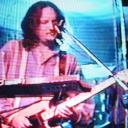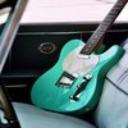Yahoo Answers is shutting down on May 4th, 2021 (Eastern Time) and beginning April 20th, 2021 (Eastern Time) the Yahoo Answers website will be in read-only mode. There will be no changes to other Yahoo properties or services, or your Yahoo account. You can find more information about the Yahoo Answers shutdown and how to download your data on this help page.
Trending News
For the T.A's here: what makes you a better guitarist? Learning to copy a solo note for note, or play with others and learn to make music?
I'm having a little tiff with a young guitarist. HE thinks that learning to copy a solo note for note and being able to shred is the epitome of learning guitar. While I am trying to get across that all the copying you do means nothing when confronted with 3-4 other guys, none of whom know the same songs, but are able to make decent music almost immediately because they know their instruments and can improvise is the more important and useful way to learn guitar, etc...Opinions?
edit:
Well..the young player in question is one we all know from his (often annoying) questions on here, so he has been playing for while now. And yes, of course we all start out learning other people's songs and trying to play solos, but he is taking it too far, I think and spends of time criticising other players who miss a note here or there when they do copy a solo, but also bitches that famous players are trying to copy others, for instance Randy Rhoads tring to copy EVH. so..WTF? lol
For guitarpicker T.A. means top answerers
11 Answers
- Norm JonesLv 75 years agoFavorite Answer
Well, for what it is worth, put me down on the side that playing with others is the greatest learning experience.
I see young players who can shred. Can play some high speed solo better than I ever could have done. But I don't really enjoy their playing. Too mechanical. It lacks the feel, the expression, the soul I think music should have. Some of the most expressive guitarists I have every had the pleasure of watching, Hendrix, Clapton, B.B. King, were not fast. They could never do a Malsteem style shred. But they were the most expressive players I saw. Nothing mechanical about their playing.
As for learning, I learned far more about how to play by playing with others. From when I was 7, I played with anyone and everyone I could. I tried to absorb as much as I could from them and from the experience of playing together. There was an open stage I used to go to every Sunday night. Well, once I got up the nerve to go up on stage and just jam blindly like that. I was hooked. Told all my buddies. Not long before guitarists from every local band showed up. On any given night, you never knew who would be there. You had no idea what you would be playing. We did all sorts of music. Even from song to song, stuff varied greatly. That was the greatest learning experience I ever had.
Sitting alone in a room trying to mechanically perfect my playing style without outside influence, seems so dry and sterile. There is no give and take. There is no blending of styles. There is no outside influence.
Sure most of us old guys, learned to play by listening to records and figuring out what was played. We learned our licks by copying what someone was doing. But we did not stop there and go isolate ourselves in a room to work on mechanical perfection. We started playing out. In bands, in jam sessions, in open stages or whatever. We absorbed all sorts of influences, licks, and techniques from others we played with (or we watched play). Mostly we learned there is an interaction. We are expressing something. The audience hears and reacts. Then we respond. Performing is expression and give and take. That is something you cannot learn locked away from others, never playing with others and never playing before the public. I would imagine most of us do not seek perfection, we seek to express and to share (and receive a response from other players or the audience). None of that happens in the vacuum of playing alone in a room locked away from other players and the audience.
You can definitely count me in on the group that loves to interact.
By the way, what the heck is T.A.?
Russell, I am guessing that is the same question I weighed in on. I strongly agreed with your answer then, and still do.
- Anonymous5 years ago
Yeah, you're right of course.
I can copy, word for word, everything all the great writers have written - Shakepeare, Dickens, Chaucer... everyone. You can write your own stories. Which of us is the better writer?
Update: I think OU812 and cnewshadow have both given good answers and I don't disagree. I might have jumped the gun a little because when I read Russell's question I was thinking of the type of player who knows nothing but simply learns solo after solo from "tab" and copying not for note (so long as someone tells them where to put their fingers for each note) is ALL they can do. Of course any player can learn a lot by working out and playing solos by better players providing they have the knowledge, understanding and maturity to do so,
A couple of points though. I think "learning to play guitar" by learning endless solos from tab and "learning every scale in the book" (and all that implies) are opposite extremes and I don't advocate either. I also think that a player who can only copy what other people have already done has no "technical ability".
- gtarczarLv 75 years ago
There are points to both concepts. We often learn HOW to improvise by doing our best to learn other peoples music note for note (or as close as you can get). Remember that not everyone has the same goals when learning to play so there is no "right" way. to do it. Music is a language and, like all languages, we learn the basics by imitating what we hear. As we become more proficient we are able to use our musical "vocabulary" to communicate with other musicians. This is the heart of improvisation, communicating with other players. Not everyone is into improv as others are. Playing with other musicians is great, whether it is a blues jam or covering an artists music note for note. A well rounded musician should have the ability to do both. To be able to play an iconic piece of music as accurately as possible and be able to bring something new to another piece of music.
Younger players are often very captivated by a specific style/genre or a specific player or players and try their best to emulate them. There is nothing wrong with that. Invariably as the player gets older and their tastes in music changes and expands, they become exposed to a wider variety of music and start to let other influences be incorporated into what they play. They become less interested in playing someone else's music note for note and start to develop their own unique style and vocabulary. This is a natural progression for many. There are exceptions to the rule, but generally this is how most players mature...
Source(s): G.I.T. graduate 35+ years playing/teaching http://www.youtube.com/user/gtarczar - GuitarpickerLv 75 years ago
When I need to play note-by-note I use sheet music to get me started, unless I am a member in a proficient band. Then, I stick with the sheet music. Rather, I prefer to play as the mood strikes me, allowing freedom of expression in chords formed and methods of stroking the fretboard.
For many years I tried to be another Chet Atkins until I realized that there was only one of him and one of me. I then focused on developing my own style of playing; using techniques of many of the guitarists of that time to form a style of my own.
Playing music with others, regardless of their instrument of choice, is, by far, a better way to go to reach that Nirvana of pleasing guitar work.
And I don't know what a T.A. is either, unless it's technical assistant.
Source(s): Guitarist since 1956 - How do you think about the answers? You can sign in to vote the answer.
- DannyLv 75 years ago
Well, IMHO, you're quite right. So much for that.
You and I have both played with, or tried to keep up with, players who weren't perfect that were still perfect. Guys with heart, soul, fire, drive, no matter the complexity of the "chart". "Improvising" not just notes & scales, but tapping into the rest of our sound, working with or around the beat, ditto the melody line, 'taking a glance as a green light to go more into what's hanging in the air, all that stuff you can't learn without 'standing up, and trying to stay that way. Non-PC, the difference between a hooker and a woman in love. 'Stepping into that one, but I'll stand by it. Meanwhile, I just shred lettuce for salad.
UPDATE: And OU812's right, too. I, however, suspect I know who you're going around with, Russell, and you will feel less stress when you finally stop banging against his particular brick wall. The relevant clinical term is "perseveration", but whatever.
UPDATE: A decent example of a "cover", everybody with their own interpretation of a simple song, and all 'way down the road from JJ Cale. https://www.youtube.com/watch?v=e6uKpwCZnkk
- OU812Lv 75 years ago
Sorry, but I don't totally agree with everyone else, of course this depends on the experience level we are talking about. But you specifically said a young player which to me says he is not a seasoned player. I mean come on guys, are you really going to tell me you didn't learn licks and phrasing by learning cover leads and trying to emulate your heroes?
I mean you can learn every scale in the book, but learning to emulate what the greats have done with these scales is how we learn to compose improvised lead.
- cnewshadowLv 75 years ago
A combination of both, actually.
Learning to play an already composed song is the hallmark of a good musician, just as writing something totally new is.
Where technical ability and creativity meet determines your skill level.
- 5 years ago
Agreed. I say "If you want to hear note perfect version, go home and put on CD". Most rewarding aspect to me in music is out there experimenting with song, like trapeze without net.
- EmdogLv 65 years ago
Agreed. I say "If you want to hear note perfect version, go home and put on CD". Most rewarding aspect to me in music is out there experimenting with song, like trapeze without net










